THE 1700s MEET THE 1960s
Back in the early 1700’s, Pierre Marivaux was a major playwright in France, but his romantic comedies never made much of an impact on the American stage until the 1990s, when opera and theater director Stephen Wadsworth translated Marivaux’s plays into English. Wadsworth’s successful adaptations made Marivaux a significant presence in American theater. He hasn’t been performed much on Broadway, but regional theaters revive him regularly (Broadway gave a stab at musicalizing Marivaux in 1997, but Triumph of Love and its all-star cast could only muster up 85 performances).
In Chicago, Remy Bumppo Theatre is having a brave go at Wadsworth’s version of Marivaux’s romantic drama Changes of Heart (earlier known by the clunky title of The Double Inconsistencies). At 2 hours and 45 minutes (including two intermissions), the play feels too long and requires some patience from the audience. The first act sets in motion a story that seems thin and a bit silly, but the show builds over the next two acts, saying some stimulating things about love, fidelity, morality, and the vagaries of the human heart.
The Prince (Steve Wojtas) of an unidentified kingdom is passionately in love with Silvia (Alana Arenas), a plainspoken village girl who has been taken to the Prince’s palace where the monarch hopes to woo her for his bride. Silvia disdains the besotted Prince’s overtures, for she loves a village lad named Harlequin (Nicolas Gamboa). (Harlequin is the name of the stock character in Italian Commedia dell’arte, usually a clown or comic servant.) Silvia’s verbal condescension towards the Prince in much of the first act substantiates her inability to comprehend why the Prince loves her when she does not love him back.
The story centers on the efforts by the Prince and his confederate Flaminia (Linda Gillum) to pry Silvia’s affections away from Harlequin and channel them to the Prince. After a vast amount of manipulation and conniving, the romantic alliances are sorted out; the Prince gets Silvia and Flaminia connects with Harlequin. But it’s not the ending that makes Changes of Heart worth seeing, it’s the process. The main characters are eloquent and passionate in their declarations of love and, setting aside the ostentatious improbability of the narrative, they are well worth hearing. Silvia in particular delivers some scintillating verbal arias about love and commitment; she is the most plainspoken character in the play, being a simple village girl, unencumbered with the affectations that drench the Prince’s court.
There are a handful of other characters in the play, the most important being a court valet named Trivelin (D’Wayne Taylor), who gets enmeshed in the machinations to bring Silvia and the Prince into a happy union. Flaminia’s coquettish sister Lisette (Jessica Maynard) and a character known as the Lord (Shawn Douglas) appear in a few scenes, but they are marginal to the main action. Substantive support comes from Jake Szczepaniak, a young man who appears at the beginning of each act, lip-syncing songs that are played on an on-stage phonograph. The character has no dialogue and no discernible purpose in the narrative, but he’s great fun to watch and endows the production with its best comic moments.
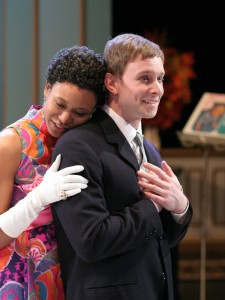 Director Timothy Douglas takes a bold leap in transferring the time of the play from the early 1700s to 1960s’ Chicago, hoping to inject some story-enriching cultural and racial overtones (Arenas is African American and Gamboa assumes a thick, occasionally impenetrable accent that sounds Hispanic). If the transference made any modern statements, they eluded me. Nothing is specifically made of Silvia’s race and there are no recognizable references to Chicago. Silvia’s descriptions of the dissembling and hypocritical life of the Prince’s court may bear some connection to the Chicago city council or upper class society, but that’s a real reach. The only clear identification with the ’60s resides in those pop phonograph records that set Szczepaniak cavorting so delightfully around the stage. Still, by placing the story in more modern days, Douglas undoubtedly saved the company a considerable financial outlay in seventeenth century costumes.
Director Timothy Douglas takes a bold leap in transferring the time of the play from the early 1700s to 1960s’ Chicago, hoping to inject some story-enriching cultural and racial overtones (Arenas is African American and Gamboa assumes a thick, occasionally impenetrable accent that sounds Hispanic). If the transference made any modern statements, they eluded me. Nothing is specifically made of Silvia’s race and there are no recognizable references to Chicago. Silvia’s descriptions of the dissembling and hypocritical life of the Prince’s court may bear some connection to the Chicago city council or upper class society, but that’s a real reach. The only clear identification with the ’60s resides in those pop phonograph records that set Szczepaniak cavorting so delightfully around the stage. Still, by placing the story in more modern days, Douglas undoubtedly saved the company a considerable financial outlay in seventeenth century costumes.
Changes of Heart, at least in the Remy Bumppo presentation, asks much from the spectator. The down to earth Silvia is a bizarre match for the cartoonish Harlequin – a bumptious, ego-driven young man played with over-the-top bravado by Gamboa, who is dressed in a weird outfit that blends commedia dell’arte conventions with the look of an Australian bushranger (costumes designed by Lea Sands). It’s hard to take the posturing man seriously until the final scenes, when Harlequin takes off his mask and starts talking and acting like a human being. The uniting of Harlequin with Flaminia reeks of playwright expediency and the credibility of the match – Gillum being notably older than Gamboa – doesn’t add up. It should be noted that the whole story has a strong whiff of fairy tale about it so the viewer should cut the assorted lovers some slack.
The acting is fine where it counts: Arena’s Silvia is persuasive throughout, whether she is ranting against the Prince or gradually succumbing to him. Wojtas makes a winning and sympathetic figure out of the Prince – a nice guy even if he did use his political muscle to kidnap the unwilling and outraged Silvia – and the always reliable Linda Gillum nicely maneuvers through Flaminia’s scheming. As to Gamboa, he does what he does expertly; whether his extravagant impersonation of Harlequin succeeds or annoys resides in the eye and ear of the spectator.
The physical production is dominated by Stephen Carmody’s set – a black and white checkerboard floor, some eighteenth-century chairs, a screen to conceal eavesdropping characters, and a set of double doors to permit characters to enter and exit, often in a state of high emotion. Lee Fiskness designed the lighting and Nick Keenan the sound.
Changes of Heart may be long, but Marivaux was a leisurely writer. The diligent viewer will be rewarded with a handful of fine performances and a great deal of stimulating discussion about the many textures of love. The play as it appears in this production may not be for every taste, but it stands out as a gutsy choice by Remy Bumppo.
photos by Johnny Knight
Changes of Heart
Remy Bumppo Theatre Company
Greenhouse Theater Center, 2257 N. Lincoln Ave.
ends on January 8, 2012
for tickets, call 773.975.8150 or visit Remy Bumppo
for more shows, visit Theatre in Chicago
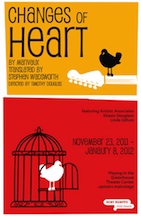
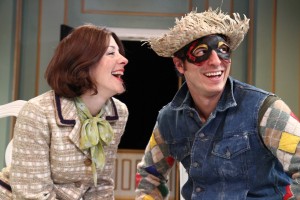
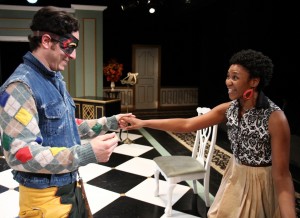
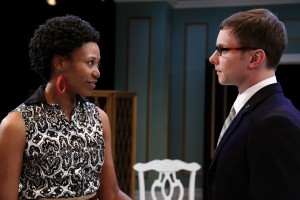
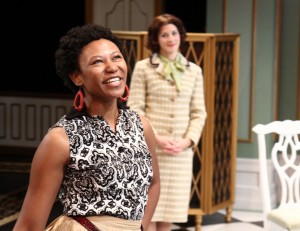
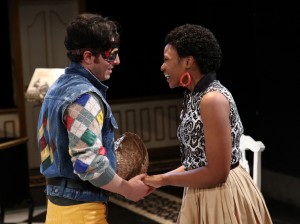
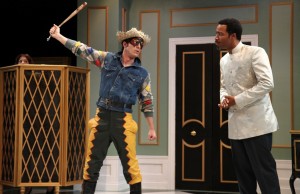
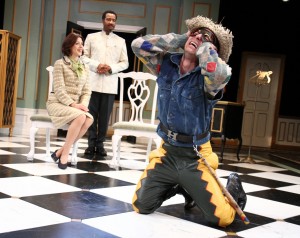

{ 1 comment… read it below or add one }
Gamboa is Colombian. No affectation. Accent not assumed.